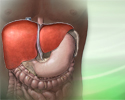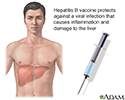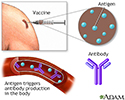Hepatitis
Hepatitis is swelling and inflammation of the liver.
The Basics
Tests for Hepatitis
Hepatitis B - Animation
Hepatitis B
Animation
Hepatitis C - Animation
Hepatitis C
Animation
Hepatitis A - Animation
Hepatitis A
Animation
Hepatitis B - Animation
Hepatitis B
Health Capsule
Hepatitis B
The hepatitis B vaccine is recommended for healthcare workers, people who live with someone with hepatitis B, and others at higher risk. The hepatitis B virus can damage liver cells. Immunization is also recommended for all infants and unvaccinated adolescents.
Hepatitis B
illustration
Hepatitis C
Hepatitis C is a virus-caused liver inflammation which may cause jaundice, fever and cirrhosis. Persons who are most at risk for contracting and spreading hepatitis C are those who share needles for injecting drugs and health care workers or emergency workers who may be exposed to contaminated blood.
Hepatitis C
illustration
Hepatitis A
A fly may act as a mechanical vector of diseases such as Hepatitis A, which means the fly carries the infective organism on its feet or mouth parts and contaminates food or water which a person then consumes. A biological vector actually develops an infective organism in its body and passes it along to its host, usually through its saliva. A fly can be a biological vector, as in the transmission of leishmaniasis by the sandfly.
Hepatitis A
illustration
Hepatitis A immunization (vaccine)
Immunization is a process to initiate or augment resistance to an infectious disease. The goal of immunization is to prevent, and in some cases eradicate, potentially serious, life-threatening diseases.
Hepatitis A immunization (vaccine)
illustration
Hepatitis B virus
Hepatitis B is also known as serum hepatitis and is spread through blood and sexual contact. It is seen with increased frequency among intravenous drug users who share needles and among the homosexual population. This photograph is an electronmicroscopic image of hepatitis B virus particles. (Image courtesy of the Centers for Disease Control and Prevention. )
Hepatitis B virus
illustration
Chronic hepatitis
Chronic hepatitis is a liver disease caused by infection, drug ingestion, metabolic or autoimmune disorders. Necrosis (death) of liver cells, inflammation, and fibrosis that occur in chronic hepatitis may lead over time to liver failure.
Chronic hepatitis
illustration
Hepatitis B - Animation
Hepatitis B
Animation
Hepatitis C - Animation
Hepatitis C
Animation
Hepatitis A - Animation
Hepatitis A
Animation
Hepatitis B - Animation
Hepatitis B
Animation
Hepatitis B
The hepatitis B vaccine is recommended for healthcare workers, people who live with someone with hepatitis B, and others at higher risk. The hepatitis B virus can damage liver cells. Immunization is also recommended for all infants and unvaccinated adolescents.
Hepatitis B
illustration
Hepatitis C
Hepatitis C is a virus-caused liver inflammation which may cause jaundice, fever and cirrhosis. Persons who are most at risk for contracting and spreading hepatitis C are those who share needles for injecting drugs and health care workers or emergency workers who may be exposed to contaminated blood.
Hepatitis C
illustration
Hepatitis A
A fly may act as a mechanical vector of diseases such as Hepatitis A, which means the fly carries the infective organism on its feet or mouth parts and contaminates food or water which a person then consumes. A biological vector actually develops an infective organism in its body and passes it along to its host, usually through its saliva. A fly can be a biological vector, as in the transmission of leishmaniasis by the sandfly.
Hepatitis A
illustration
Hepatitis A immunization (vaccine)
Immunization is a process to initiate or augment resistance to an infectious disease. The goal of immunization is to prevent, and in some cases eradicate, potentially serious, life-threatening diseases.
Hepatitis A immunization (vaccine)
illustration
Hepatitis B virus
Hepatitis B is also known as serum hepatitis and is spread through blood and sexual contact. It is seen with increased frequency among intravenous drug users who share needles and among the homosexual population. This photograph is an electronmicroscopic image of hepatitis B virus particles. (Image courtesy of the Centers for Disease Control and Prevention. )
Hepatitis B virus
illustration
Chronic hepatitis
Chronic hepatitis is a liver disease caused by infection, drug ingestion, metabolic or autoimmune disorders. Necrosis (death) of liver cells, inflammation, and fibrosis that occur in chronic hepatitis may lead over time to liver failure.
Chronic hepatitis
illustration
Hepatitis
Hepatitis is swelling and inflammation of the liver.
The Basics
Tests for Hepatitis
Hepatitis
Hepatitis is swelling and inflammation of the liver.
The Basics
Tests for Hepatitis
Review Date: 3/31/2024
Reviewed By: Jenifer K. Lehrer, MD, Department of Gastroenterology, Aria - Jefferson Health Torresdale, Jefferson Digestive Diseases Network, Philadelphia, PA. Review provided by VeriMed Healthcare Network. Also reviewed by David C. Dugdale, MD, Medical Director, Brenda Conaway, Editorial Director, and the A.D.A.M. Editorial team.











